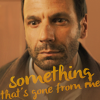Alien Clay (Adrian Tchaikovsky) (2024): Hugo nominee, audiobook read by Ben Allen. Ex-biology professor is shipped off to an extrasolar labor camp for crimes against the totalitarian Mandate, where he is first drafted as a (silently) grumbling lab assistant, then demoted to the Expeditions team that clears alien ruins for the "real" scentists to study. This would be great fun for a biologist, except for the part where the planet's flora think humans look interesting to colonize, ultimately a death sentence. Well, a faster death sentence than being sent to an extrasolar labor camp, anyway.
First person present tense. I forget how tense this makes the read until the story opens, and my reaction is "oh this again" with a little active untensing of the shoulders. Which probably didn't contribute to me taking the novel for what it is, rather than what I wanted it to be.
( Revolution as narrow obsession. )
From this, I think I can conclude I'm not the target audience for Alien Clay.
A Sorceress Comes To Call (T. Kingfisher) (2024): More Hugo reading, again in audiobook, narrated this time by Eliza Foss and Jennifer Pickens. Dual first person PoVs from Cordelia, the daughter of the titular sorceress Evangeline, and Hester, whose brother is ensnared in Evangeline's plot to a.) marry into a little money, b.) marry off Cordelia into real money, c.) arrange the early deaths of both men to gain control of everyone's money.
The novel blurb online invokes the "Goose Girl" fairytale. ( It felt to me that Kingfisher used the fairytale as a springboard. )
...it's fine. If you are up for a spot-on depiction of child abuse, with magic, this is a novel that hits the marks it sets for itself. I'm not that interested in that much uncomplicated abusive parent energy.
The Ministry of Time (Kaliane Bradley) (2024): The Hugo audiobook run continued, now narrated by Katie Leung and George Weightman. The shortest summary would be "RPF, 21st C progatonist / Graham Gore from the Franklin expedition, because time travel," which is about the least helpful explanation of the combination of romantic tropes and 21st century anxieties.
If I namecheck HP with respect to The Incandescent, I have to invoke Kage Baker's Company novels when discussing The Ministry of Time. The unnamed protagonist is hired into a top secret British Ministry which has pulled five individuals out of what the Company series would call event shadows: points in history where the "expats" died, or were believed to have died. The protagonist and her fellow "bridges" are full-tme companions and acclimitization assistants to people pulled out of England and France from the 16th through early 20th centuries, who bring their experiences and expectations with them. The Company series vibes are probably a case of convergent evolution, but there is the protagonist's ill-advised romance with a Victorian adventurer to consider.
( The execution of the premise is absolutely bonkers, and I will talk about it with massive spoilers. )
I don't know that this is a good novel, but it's the Hugo nominee that I was enjoyed enough to switch from audiobook to ebook, so I could stay up late reading it. (It always feels like I should be in motion - cleaning, or driving, or getting excercise - when I'm listening to an audiobook. Training from listening to audiobooks while in motion, probably.) It's also the novel that I want to turn over in my head, and make my friends read so we can talk about it. So props to Kailene Bradley for hugely entertaining me.
The Hugo nominees so far share the exploration of people treated as things, or ends to means. Cordelia as an extention of Evangeline, or as her tool; the Mandate's literal "work them until they die" labor camp; the Ministry's plans for their time travel expats. That might be one reason I was dragging my feet on Hugo reading this year.
First person present tense. I forget how tense this makes the read until the story opens, and my reaction is "oh this again" with a little active untensing of the shoulders. Which probably didn't contribute to me taking the novel for what it is, rather than what I wanted it to be.
( Revolution as narrow obsession. )
From this, I think I can conclude I'm not the target audience for Alien Clay.
A Sorceress Comes To Call (T. Kingfisher) (2024): More Hugo reading, again in audiobook, narrated this time by Eliza Foss and Jennifer Pickens. Dual first person PoVs from Cordelia, the daughter of the titular sorceress Evangeline, and Hester, whose brother is ensnared in Evangeline's plot to a.) marry into a little money, b.) marry off Cordelia into real money, c.) arrange the early deaths of both men to gain control of everyone's money.
The novel blurb online invokes the "Goose Girl" fairytale. ( It felt to me that Kingfisher used the fairytale as a springboard. )
...it's fine. If you are up for a spot-on depiction of child abuse, with magic, this is a novel that hits the marks it sets for itself. I'm not that interested in that much uncomplicated abusive parent energy.
The Ministry of Time (Kaliane Bradley) (2024): The Hugo audiobook run continued, now narrated by Katie Leung and George Weightman. The shortest summary would be "RPF, 21st C progatonist / Graham Gore from the Franklin expedition, because time travel," which is about the least helpful explanation of the combination of romantic tropes and 21st century anxieties.
If I namecheck HP with respect to The Incandescent, I have to invoke Kage Baker's Company novels when discussing The Ministry of Time. The unnamed protagonist is hired into a top secret British Ministry which has pulled five individuals out of what the Company series would call event shadows: points in history where the "expats" died, or were believed to have died. The protagonist and her fellow "bridges" are full-tme companions and acclimitization assistants to people pulled out of England and France from the 16th through early 20th centuries, who bring their experiences and expectations with them. The Company series vibes are probably a case of convergent evolution, but there is the protagonist's ill-advised romance with a Victorian adventurer to consider.
( The execution of the premise is absolutely bonkers, and I will talk about it with massive spoilers. )
I don't know that this is a good novel, but it's the Hugo nominee that I was enjoyed enough to switch from audiobook to ebook, so I could stay up late reading it. (It always feels like I should be in motion - cleaning, or driving, or getting excercise - when I'm listening to an audiobook. Training from listening to audiobooks while in motion, probably.) It's also the novel that I want to turn over in my head, and make my friends read so we can talk about it. So props to Kailene Bradley for hugely entertaining me.
The Hugo nominees so far share the exploration of people treated as things, or ends to means. Cordelia as an extention of Evangeline, or as her tool; the Mandate's literal "work them until they die" labor camp; the Ministry's plans for their time travel expats. That might be one reason I was dragging my feet on Hugo reading this year.






